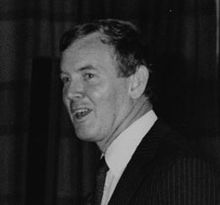John Moore, Baron Moore of Lower Marsh
|
The Right Honourable The Lord Moore of Lower Marsh PC |
|
|---|---|

Moore in 1985
|
|
| Secretary of State for Social Security | |
|
In office 25 July 1988 – 23 July 1989 |
|
| Prime Minister | Margaret Thatcher |
| Preceded by | Himself (Social Security) Kenneth Clarke (Health) |
| Succeeded by | Tony Newton |
| Secretary of State for Social Services | |
|
In office 13 June 1987 – 25 July 1988 |
|
| Prime Minister | Margaret Thatcher |
| Preceded by | Norman Fowler |
| Succeeded by | Himself (Social Security) Kenneth Clarke (Health) |
| Secretary of State for Transport | |
|
In office 21 May 1986 – 13 June 1987 |
|
| Prime Minister | Margaret Thatcher |
| Preceded by | Nicholas Ridley |
| Succeeded by | Paul Channon |
| Financial Secretary to the Treasury | |
|
In office 19 October 1983 – 21 May 1986 |
|
| Prime Minister | Margaret Thatcher |
| Preceded by | Nicholas Ridley |
| Succeeded by | Norman Lamont |
| Economic Secretary to the Treasury | |
|
In office 13 June 1983 – 19 October 1983 |
|
| Prime Minister | Margaret Thatcher |
| Preceded by | Jock Bruce-Gardyne |
| Succeeded by | Ian Stewart |
|
Member of Parliament for Croydon Central |
|
|
In office 28 February 1974 – 9 April 1992 |
|
| Preceded by | Constituency Created |
| Succeeded by | Paul Beresford |
| Personal details | |
| Born |
26 November 1937 Kentish Town, United Kingdom |
| Political party | Conservative |
| Spouse(s) | Sheila Tillotson |
| Alma mater | London School of Economics |
| Profession | Stockbroker |
John Edward Michael Moore, Baron Moore of Lower Marsh PC (born 26 November 1937) is a British politician who was Member of Parliament for Croydon Central from February 1974 until 1992. During the Premiership of Margaret Thatcher he enjoyed a meteoric rise through the ranks of government which culminated in him serving as Secretary of State for Social Services from 1987 to 1989. For a time, he was considered a rising star of the Conservative Party and a potential leadership contender.
He was particularly noted for his "filmstar good looks" and an American background. Moore's wife was American and he had lived for several years in the USA. He brought aspects of American corporate culture to government and was reported to speak with a slight American accent. His first political experience was as a Democratic Party organiser in Illinois during the early 1960s.
However, his fortunes in government waned after 1987 when he was made responsible for the highly sensitive portfolios of health and social security. His earlier success had been as a facilitator of the Thatcher government's privatisation programme. In this capacity he became known as "Mr Privatisation". When Moore attempted to extend this concept into the management of the National Health Service and the wider provision of social services, he encountered opposition from all sides. After losing credibility he was effectively demoted in 1988 (through loss of the health portfolio) and then sacked from his cabinet post in 1989.
The Times diary (13 January 1988) described him as follows;
His face it is blank, his blue tie is neat; A slight flush can be seen on his cheek; But though his jaw juts and his gestures are tough; His impression of strength comes out weak.
He left the House of Commons in 1992 and subsequently held a number of corporate directorships and chairmanships.
Moore was born in Kentish Town, London. His father was a factory worker who later became a publican. He attended the Licensed Victuallers' School in Slough, an independent school supported by his father's trade body. After leaving school Moore undertook two years of National Service from 1955 to 1957. He served with the Royal Sussex Regiment and spent some time in Korea.
...
Wikipedia
